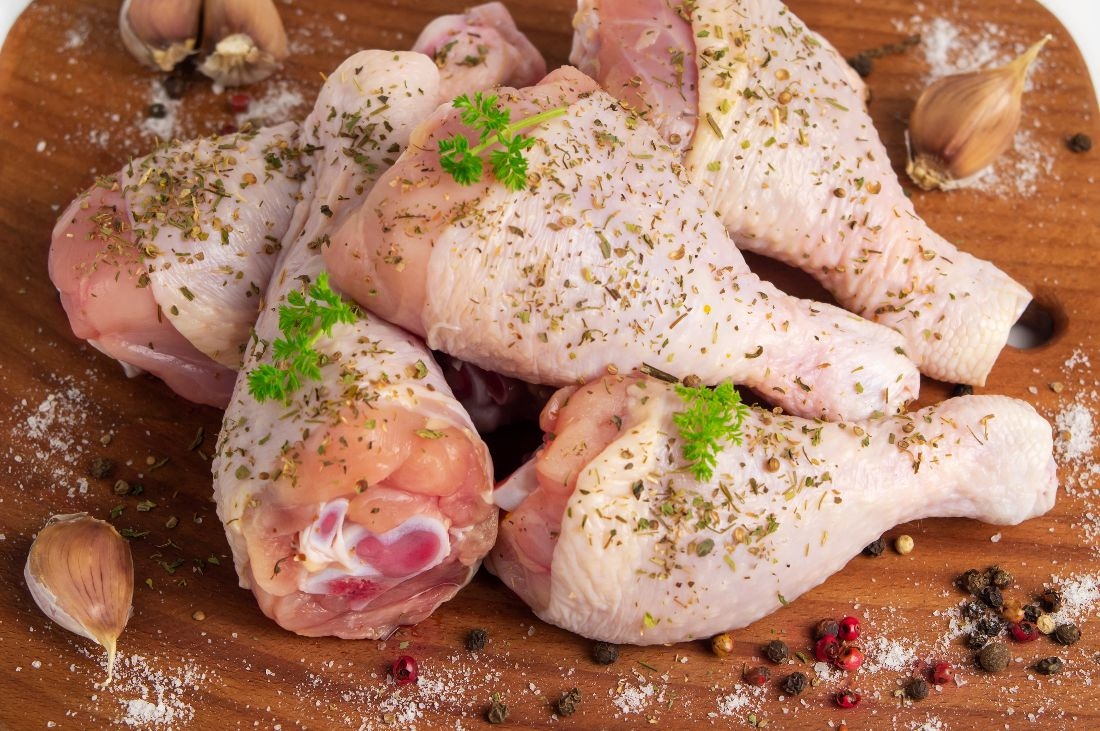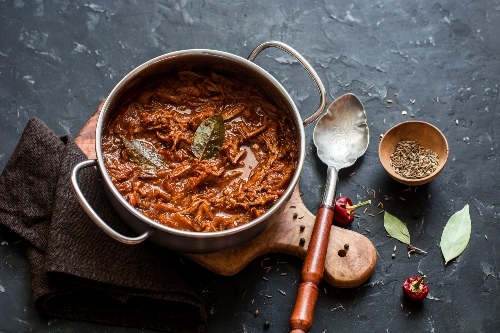Fresh vs frozen meat
Fresh vs frozen meat
We look at the advantages of fresh and frozen meat to help you find the best value from your groceries.
Frozen food can be an excellent and cost effective choice when you’re looking for ways to save money on food, especially for essential items like meat. Fortunately, there are plenty of meat options available for every budget. Whether you’re cooking a for two or food budgeting for a family of eight, our fridges and freezers have you covered. But which is best, fresh or frozen meat? Let’s find out.

What are the differences between fresh meat and frozen meat?
Meat is a popular part of diets all over the world. Juicy steaks, roasts and sausages are all packed with protein, super satisfying and easily accessible options. There’s a reason why ‘meat and three veg’ has been a Kiwi staple for decades – because it’s delicious and nutritious.
Purchasing fresh meat tends to be the more popular choice, but frozen cuts of meat have become increasingly popular over recent years. To get frozen meat, you don’t always need to purchase it frozen. If you’re keen on saving money on groceries, nothing is stopping you from buying fresh meat when it’s on special and freezing it for a later date.
Frozen meat simply means that it’s been put into a frozen state (stored at a temperature lower than -18°C) to extend its shelf life. When frozen, the metabolic processes within the meat are drastically slowed, making it last longer. These days, there are many freezing and chilling methods that can be used to freeze meat:
Benefits of fresh meat
Taste and texture
There’s a general consensus that fresh meat is tastier and has a more consistent texture. When meat is frozen, ice crystals can form, which can damage the cell membranes. This primarily affects the lean muscle fibres but has no impact on the fat. Any excess air in the meat’s packaging can lead to drying or freezer burn. However, this can be minimised by vacuum sealing your meat or storing it in a completely airtight container. Individual quick frozen or blast frozen meat that is thawed properly should have no difference in flavour and quality.
As a rule, you want to freeze as quickly as possible and thaw as slowly as possible to maintain your frozen meat’s best quality.
Convenience
There’s no thawing needed with fresh meat. Just pick it up from your local butcher or grocery store, take it home, and prepare straight away. Cooking with frozen meat requires a bit of forward-thinking as you’ll need to pull it out of the freezer to thaw overnight. Once defrosted, you should never refreeze it, or you risk foodborne illnesses. Buying only as you need can help with reducing food waste.
Did you know? New Zealand households and businesses sent more than 300,000 tonnes of food to the tip in 2020. Check out the Ministry for Primary Industries’ tips to help safely reduce waste in your home.
Benefits of frozen meat
Affordability
We think this is the most significant advantage of frozen meat. If you’re wondering what to look for when buying meat on a budget, our supermarket freezers can be your best friend. You’ll often find that frozen meats are cheaper because they’re less likely to expire on the supermarket shelf. A premium cut of meat can be snagged for a fantastic price.
Longevity
One of the biggest limitations of fresh meat is its shelf life. Most fresh meat needs to be eaten relatively quickly after purchase. On the other hand, frozen meats can last anywhere between four months to a whole year in the freezer, depending on their cut. Stocking your freezer with a range of meats can be a cost-effective way to eat healthy on a budget.
Many cuts of red meat freeze well, even flavourful cuts like lamb shoulder chops can be stored for months and cooked to tender perfection after thawing.
Seasonality
Every type of meat has seasons of the year when it’s most readily available and at its best. Naturally, this means that the prices of these fresh meats can fluctuate just like they do for seasonal vegetables and fruits. However, this rule doesn’t apply to frozen meats – which tend to be equally available year-round and at the same lower price point.
Fresh vs frozen chicken
Chicken is one of the most readily available and highly consumed meats in New Zealand. Chicken is a super versatile family favourite in all kinds of meals like parmigiana, stir-fries and even healthy homemade takeaways versions of burgers.

Storage life
The main difference between frozen and fresh poultry is the storage life. Fresh poultry should be kept for no longer than two days in the home refrigerator, while frozen poultry can last for many months in the freezer. Let’s look at the average freezer storage life of a few cuts that are most commonly used:
Whole – up to a year
Parts (drumsticks, wings, thighs) – up to nine months (tastier before the six month mark)
Boneless skinless breasts – up to six months (tastier before the four month mark)
Taste and flavour
Whole chicken and parts tend to freeze a bit better than boneless skinless breasts. This is because the breasts lack high fat content and instead have higher water content. Water in meat can freeze and turn to crystals, eventually altering the structure, sometimes making white meat bland and watery if frozen too long.
As long as you follow the guidelines and don’t leave your poultry in the freezer for too long, the taste and flavour should remain an acceptable quality. A blind taste test of a whole chicken or some drumsticks will often provide similar results, whether fresh or frozen.
Nutrition
There is no nutritional difference between fresh and frozen chicken – so congratulate yourself on introducing some nutritious protein into your diet every time you eat it!
Thawing
The best and safest way to thaw meat of any kind is in the refrigerator overnight. Alternatively, if you’re in a hurry, you could place your wrapped meat in the sink or a large bowl and fill it with cold water. Change the water every thirty minutes or so as your meat continues to defrost. Remember to thaw it fully, or it won’t cook through in the middle.
Whether you’re using frozen or fresh poultry, make sure it’s always cooked all the way through. Once you’ve completed the cooking process, the juices should run clear and there should be no pinkness in the centre. Refrigerate any leftovers on the lowest shelf and keep them separate from other foods. And if you reheat your meat, make sure it’s piping hot. Warm doesn’t kill parasites, but hot does.
Fresh vs frozen beef
New Zealand’s green pastures, fresh air and sunshine offer the perfect conditions for the highest quality beef and lamb. It’s no wonder then that we love to cook and eat red meat. But how does freezing these cuts affect them? Does it impact their flavour or their nutrient value?

Storage life
Just like with any frozen food, the storage life of beef can be extended through the process of freezing.
Taste and flavour
Many cuts of beef and lamb freeze incredibly well. Mince, short ribs, shoulder, brisket, shanks, and cheeks can still be cooked perfectly as long as the meat freezes properly and is not exposed to any freezer burn. Some argue that beef cuts cooked low and slowly are even more tasty and tender if they’ve been frozen.
If you’re looking for handy meal prep ideas, beef stews, pies and lasagnes are all good options to freeze once cooked for a quick and convenient meal.
It’s up for debate whether steaks are best as a fresh food or a frozen food. They are best cooked when at their ultimate freshness to retain their quality, colour, tenderness, and juiciness. However, a frozen steak can still be tasty. Just keep in mind that too much exposure to air during the freezing process can affect its texture and make it tough. The rarer you’re cooking it, the fresher it needs to be.
Nutrition
Like poultry, there is no more nutrition and no less nutrition in either frozen beef vs fresh beef. Thawing Follow the same rules you would when thawing poultry. It is safe to cook beef from frozen in the oven, stove or grill without defrosting it first. Just keep in mind your cooking time will be about 50% longer. Don't cook beef from frozen in a slow cooker.
Fresh vs frozen pork
Storage life
Taste and flavour
Certain meats are more easily damaged through the freezing process. Naturally tougher cuts that are prepared slowly at a low temperature (for instance, a pulled pork, pork roast, or a lamb shank) should have just as much flavour even after freezing. However, leaner cuts like a pork loin or steak will be more susceptible to damage because of their low-fat content. Once frozen, these can be dryer and tougher than they would be fresh.
Nutrition
Freezing should have no impact on the nutritional benefits of any pork cuts.
Thawing
Remove your meat from the freezer and follow the same process you would for poultry or beef. Make sure you do not leave pork at room temperature, as this can lead to foodborne illnesses. Once thawed, pork meat should be cooked to a minimum internal temperature of 63°C then rested for several minutes before serving.
Fresh vs frozen sausages
Is there anything better than a good old Kiwi sausage sizzle? Snags are known for being one of the most popular barbeque foods. But how do our favourite saussies go when their meat freezes? Do defrosted meat sausages taste just as good as their fresh food versions?

Storage life
Taste and flavour
Most sausages are known for having high fat content, which is actually a helpful quality when freezing. For the most part, your sausages should taste no different whether they’ve been stored in the freezer or the fridge. Nutrition Just like other meats, freezing sausages makes no difference to their ability to nourish your body!
Thawing
Sausages should be thawed just as you would thaw any other meat. Once thawed, throw them in the oven, in the pan or on the BBQ for a tasty meal.
Fresh vs canned meat
When comparing frozen and fresh meat, we would be remiss not to mention the benefits of canned meat, like corned beef or canned chicken. As one of the most affordable food substitutes, canned meat has some undeniable benefits:
Longevity
Any canned food has a ridiculously long shelf life. Fresh meat will only last a few days, but canned meat can last years.
Affordability
Canned meat can often be more affordable than a fresh cut.
Convenience
One of the best qualities of canned foods is that they’re almost always safe to eat straight from the jar. No need to get it up to temperature; just open and eat.
Availability
Canned meat is available year-round, regardless of the season. However, we should mention that the nutritional value, versatility and variety of fresh and frozen meat tends to rate higher than canned meat.
Whether it’s sizzling bacon or a juicy chop, pork is known for being one of the tastiest meats around. But when it comes to pork, is there a difference between frozen and fresh meat quality? Let’s take a closer look.
Just like with any other meat, the freezer storage life depends entirely on the cut.